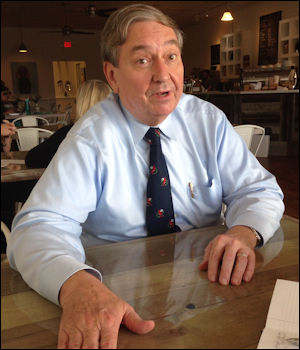by James A. Bacon
With all the bad press that Virginia’s Medicaid program has been getting recently, the prospect of the General Assembly enacting an expansion of the health care entitlement in 2016 are just about nil. First came a report last month that the state wasted $21 million last year paying Medicaid benefits to recipients who no longer qualified. Then the McAuliffe administration revealed that the state share of funding Medicaid is forecast to surge in the next two-year budget cycle, boosting the annual cost from $7.9 billion in fiscal 2015 to $9.3 billion in fiscal 2018.
That’s without expanding Medicaid as allowed for in the Affordable Care Act. While the federal government has covered 100% of the cost for an introductory period, state governments will have to begin paying a share of the cost beginning in the next fiscal year, eventually topping out at 10% of the added spending.
Virginia Republicans have held fast against expanding the entitlement. Their primary argument has been one of fiscal responsibility: Every state dollar spent on Medicaid is one less dollar that can be invested in K-12 schools, higher education, and other pressing state needs. But Medicaid doesn’t exist in a vacuum. It needs to be seen against a larger backdrop of reforming a largely dysfunctional health care system and a tattered social safety net.
Yesterday I sat down with Del. John O’Bannon, R-Henrico, a practicing physician who happens to be vice chair of the House Health, Welfare and Institutions Committee, to discuss the wellness (or lack of it) of Virginia’s health care system. The thrust of my questions was this: It’s all very fine to oppose Medicaid expansion on fiscal grounds, but the health problems of poor and near-poor Virginians are real. What do Republicans propose as an alternative?
His answer comes in two parts. First, the General Assembly has steered more funds into the state’s mental health programs and into free clinics. Said O’Bannon: “We’re for strengthening the safety net.” But he prefers programs that Virginia can control without federal interference or that leverage private-sector philanthropy. Second, the state should do more to promote competition and transparency to contain medical costs and improve outcomes for all Virginians, including the poor. In this post, I’ll focus on the first approach.
In the current fiscal year, the General Assembly approved $125 million in new safety-net funding for mental health, free clinics and Federal Health Centers.
Of that amount $96 million is dedicated to SMI mental health, which, with an equal match from the feds, should treat 20,000 people with serious mental illness. (SMI stands for Serious Mental Illness.)
The balance of the new funds supports free and affordable clinics, which provide physician care, x-ray services, lab services, immunizations, preventive services, prescription drugs, and some dental care to Virginians lacking other health care coverage. According to FreeClinics.com, there are 254 clinics in the state of Virginia. Some clinics are federally sponsored Community Health Centers, which may charge patients a fee, depending on income, while others are entirely free. While coverage does not extend into every nook any cranny of the state, it is extensive. In Southwest Virginia, the mobile Health Wagon fills in some of the gaps by providing care services to residents of 11 counties.
State funds complement charitable donations and professional time contributed by doctors, nurses and other volunteers, while the Virginia Health Care Foundation works with pharmaceutical companies to contribute prescription drugs.
Although free/affordable clinics do provide primary health care to hundreds of thousands of Virginians, the health safety net is “stretched as never before,” states the website of the Virginia Health Care Foundation. “Free clinics reported up to a four-month wait for patients seeking a first appointment. Some have instituted lotteries to determine who can receive care. Other clinics are simply unable to accept new patients because of capacity and/or resource limitations.”
As imperfect as the safety net may be, Virginia’s dense network of free/ affordable clinics is “unique” in the country, says O’Bannon. By comparison, he says, Maryland doesn’t have a single free clinic. Instead of expanding Medicaid, with its arbitrary rules and fiscally unsustainable cost, Virginia should focus on strengthening its home-grown institutions that are inherently closer and more responsive to the community.



